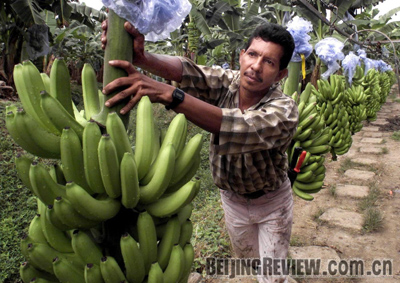| 
BANANA BARRIER: A farmer works on a banana plantation in Santa Marta, Colombia. The banana trade was one of the most contentious issues in the recent Doha Round talks in Geneva
On July 29, after nine days of marathon negotiations, trade ministers from 35 major World Trade Organization (WTO) member states meeting in Geneva failed to reach agreements on key issues, despite some other achievements. The Doha Round of WTO negotiations ended in failure again, with the talks plunged into an indefinite recess.
The Doha Round fell into a stalemate because of the agricultural special safeguard mechanism (SSM). The SSM would allow developing countries to raise tariffs to protect domestic agriculture in the event of an import surge. WTO Director General Pascal Lamy's compromise proposal of July 25, which formed the basis for the subsequent negotiations, put the import surge threshold at 40 percent. According to the proposal, developing countries could use the SSM to raise tariffs to restrict the import of foreign agricultural products if their agricultural imports surge 40 percent for three consecutive years.
Developing countries led by India hoped to lower the threshold to protect their vulnerable agricultural sector and safeguard their food security. India suggested that a developing country should be allowed to resort to the SSM, when its agricultural imports surge 15 percent for three consecutive years. India's proposal should have been taken as a starting point for further negotiations: If 15 percent is not workable, how about 20 percent or 25 percent? As a rule, agreements are reached through compromise. The United States, however, categorically opposed the proposal, causing the negotiations to collapse.
On the surface, this is a dispute between the United States and India. But as a matter of fact, it is a dispute between WTO's developed and developing members, because some 100 developing members support India's proposal. Sun Zhenyu, China's Ambassador to the WTO, said the proposal concerned the issue of survival for many developing members.
An issue of development
The topics under discussion in the Doha Round are known as the "Doha Development Agenda," which calls for balanced solutions to issues of concern to developing members based on trade liberalization. It will be a major test for the WTO, the international body dedicated to creating a multilateral trading system, to enshrine the principle of development in its world trade regulations and negotiations so as to realize the goal of development and integrate developing members safely and effectively into the process of economic globalization. Of the WTO's 153 members, about 30 are developed members, accounting for only one fifth of the total. During negotiations, developed members should honor their promise to take into consideration the interests and concerns of developing members.
In the 1960s, the United States and developed European countries that were parties to the General Agreement on Tariffs and Trade (GATT), the WTO's predecessor, took advantage of their rule-making authority to place their weaker economic sectors--agricultural products and textiles-outside GATT jurisdiction. They imposed heavy export subsidies and high import tariffs on agricultural products and implemented a strict import quota system for textiles. In contrast, they advocated a zero-tariff policy for their competitive industries such as information products. The United States and European countries also demanded that other countries open their service sectors, including finance and insurance. Over the years, developed WTO members have established a double standard in the world economy under the pretext of fair trade, drawing strong opposition from developing members.
|
